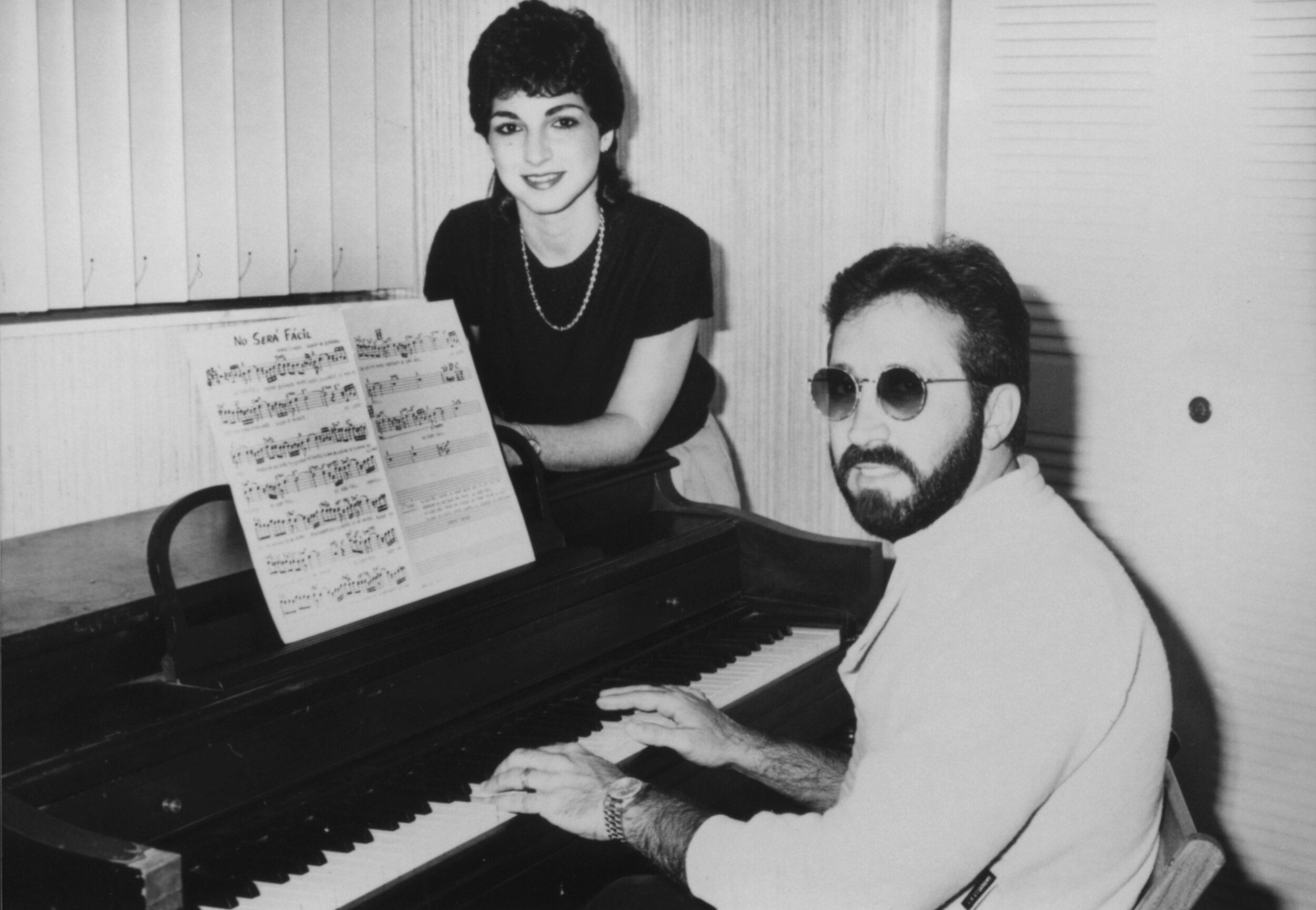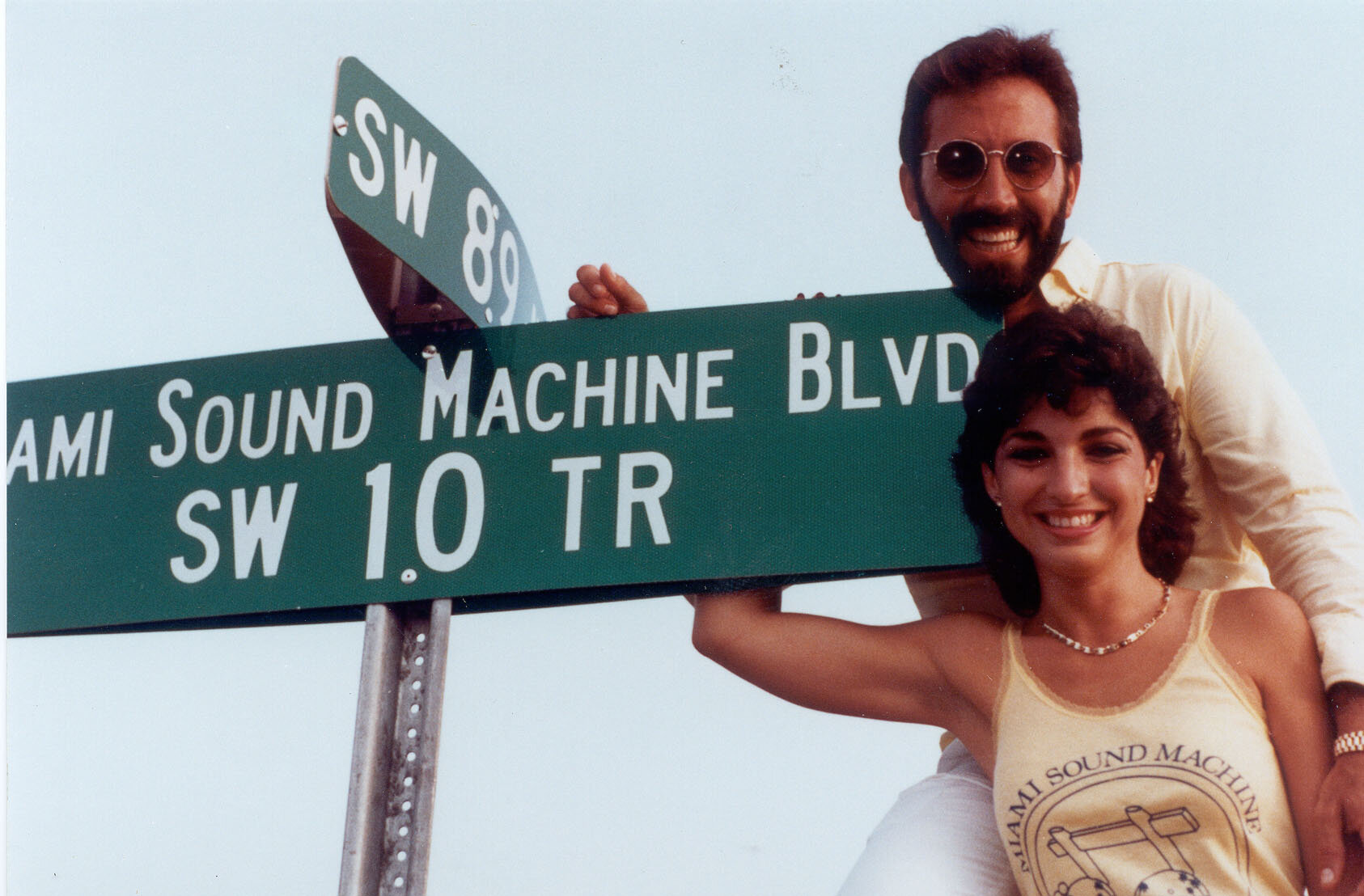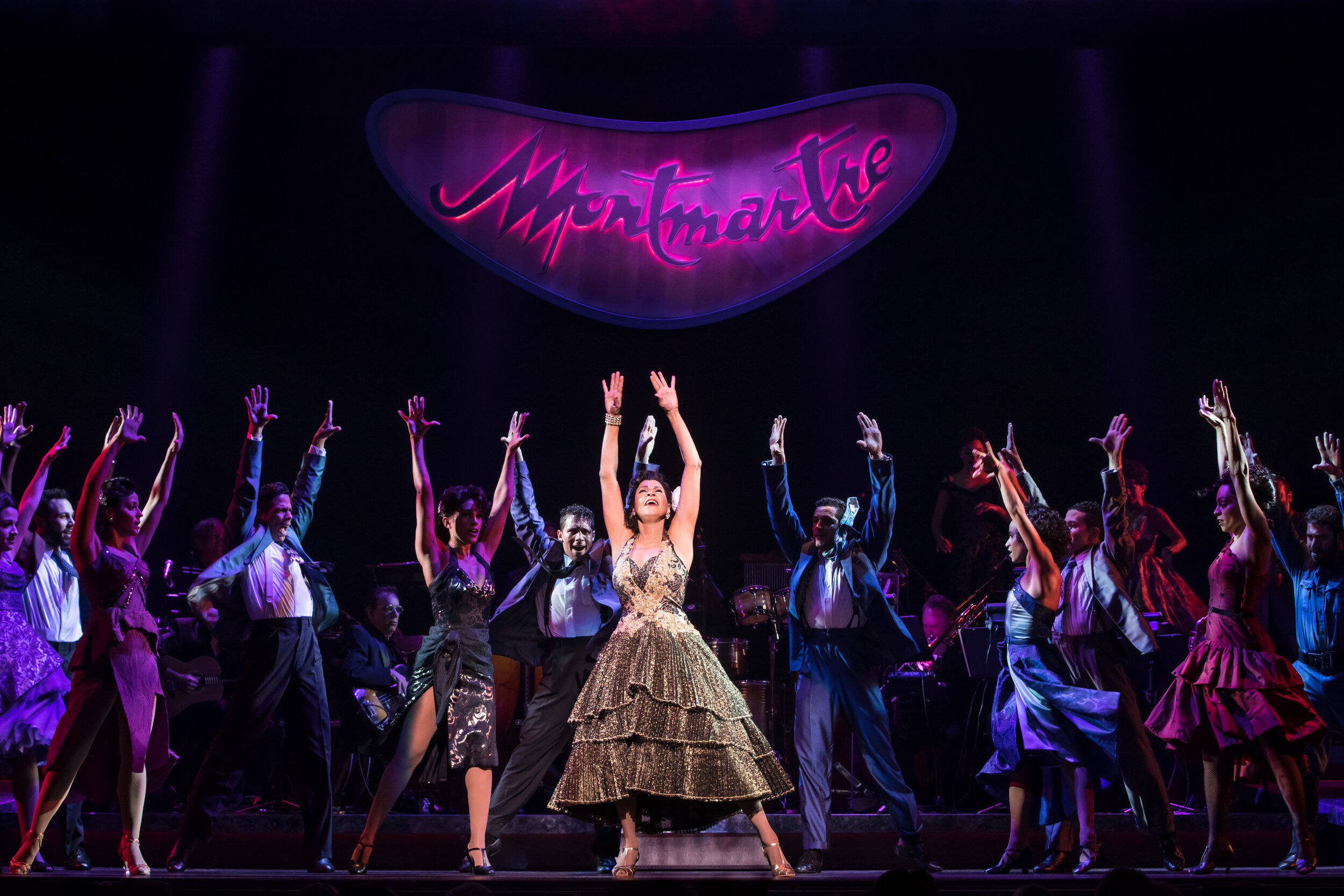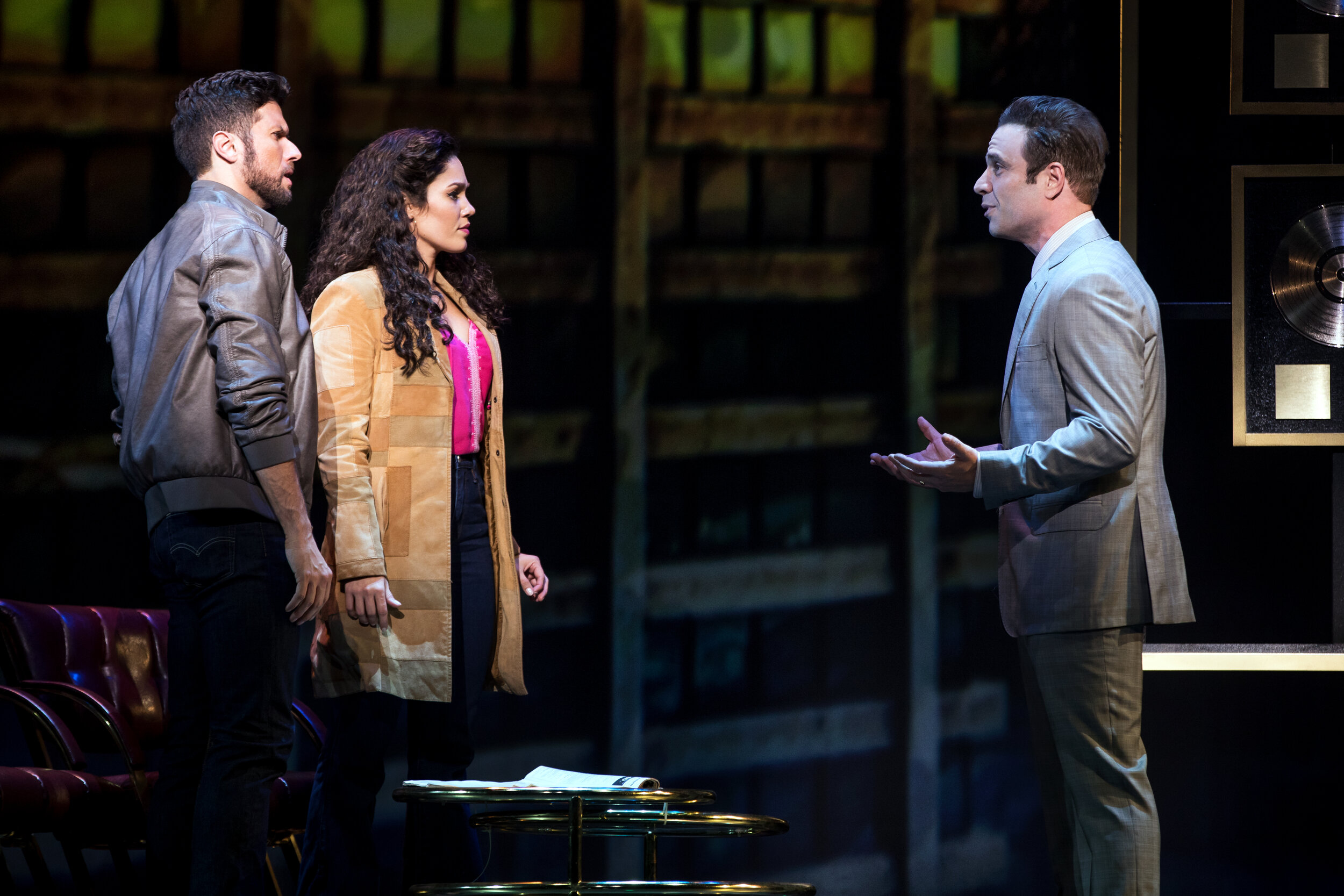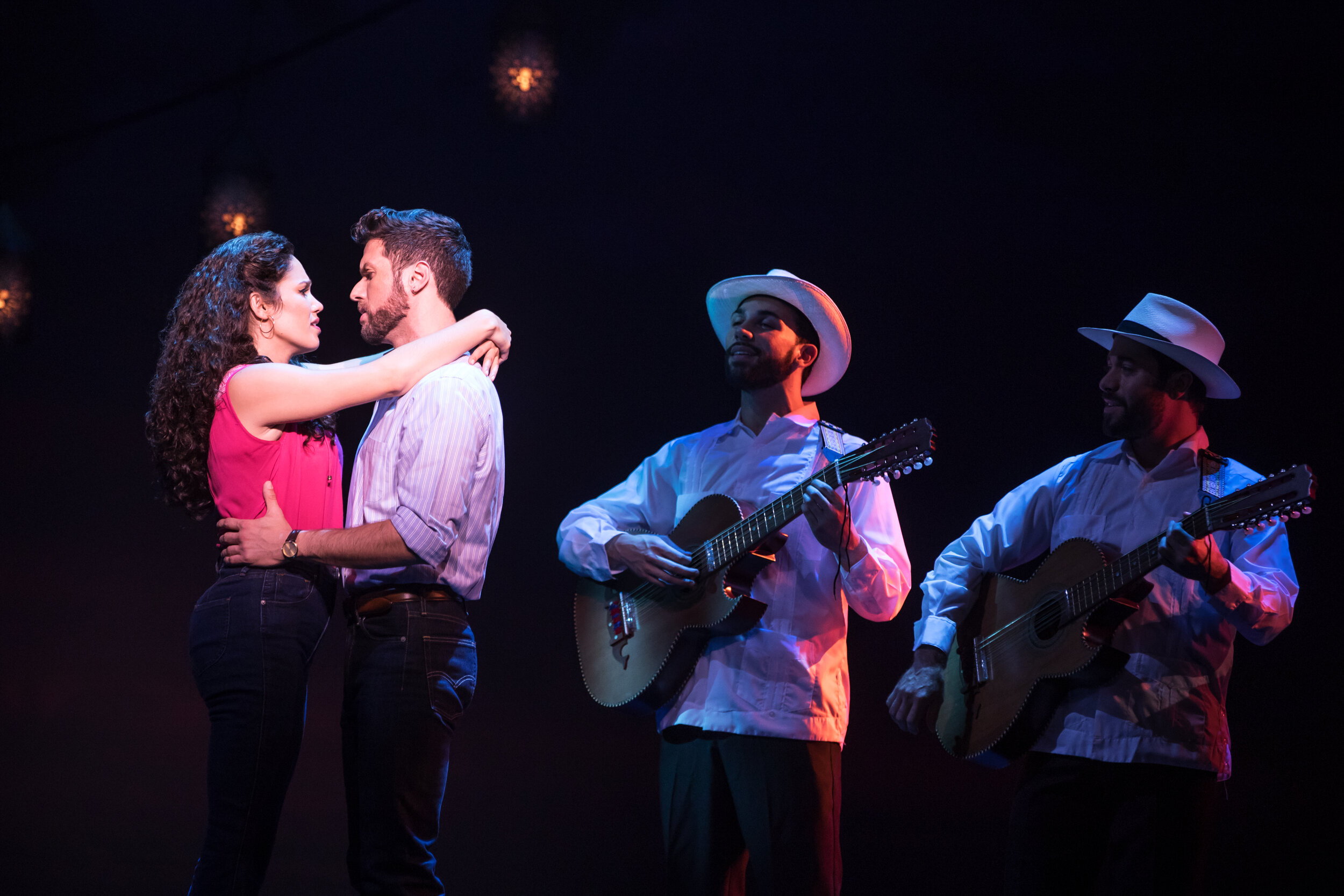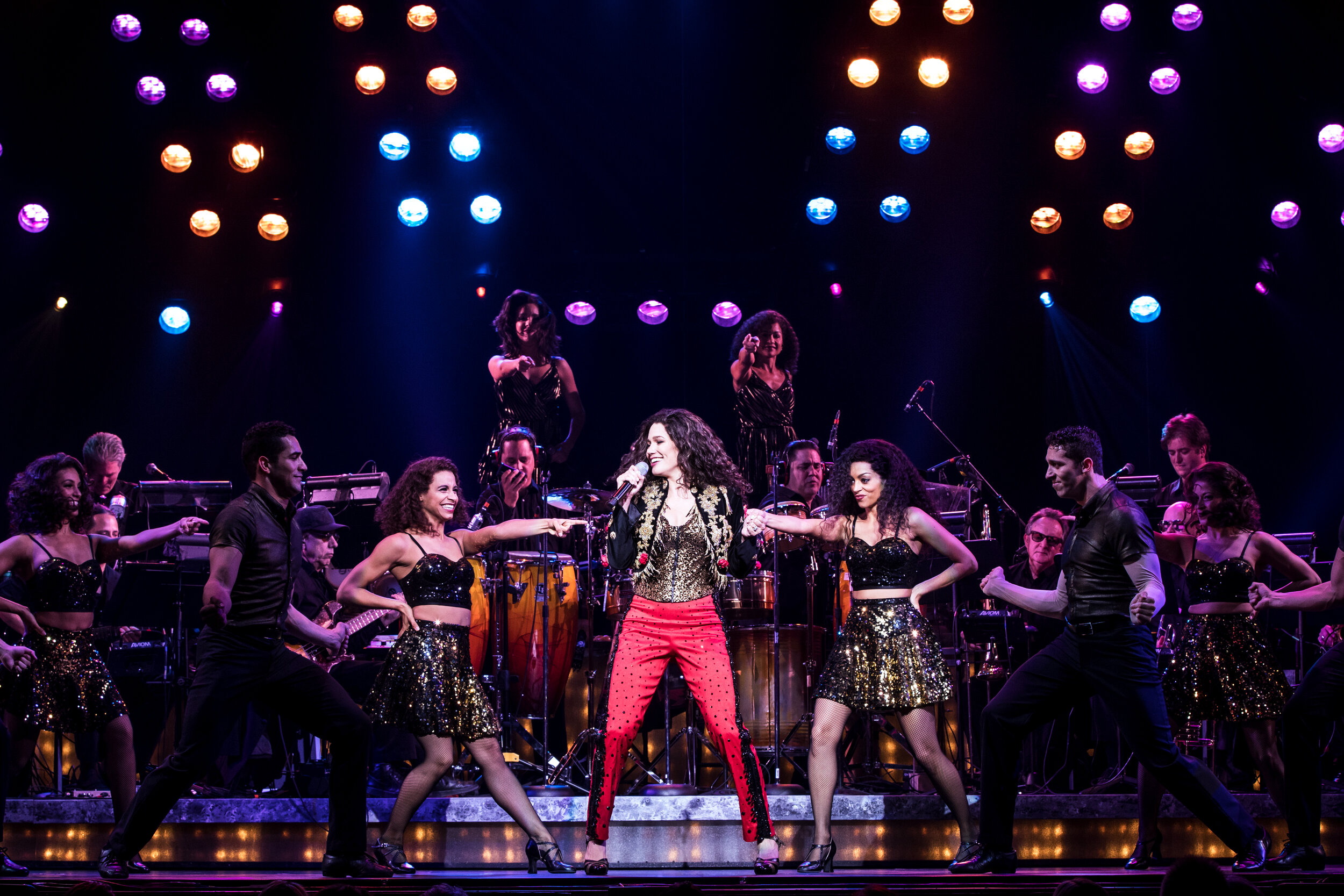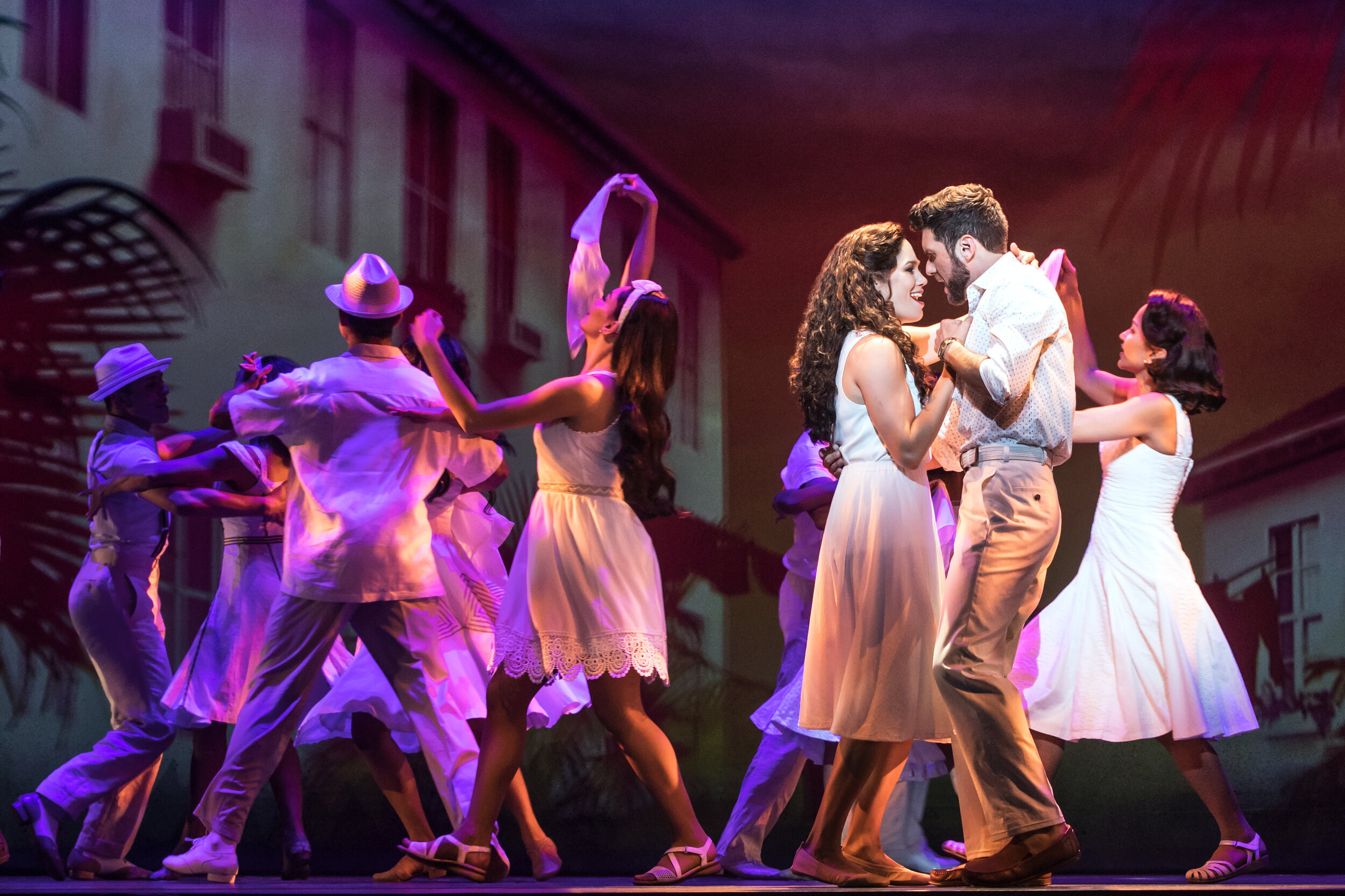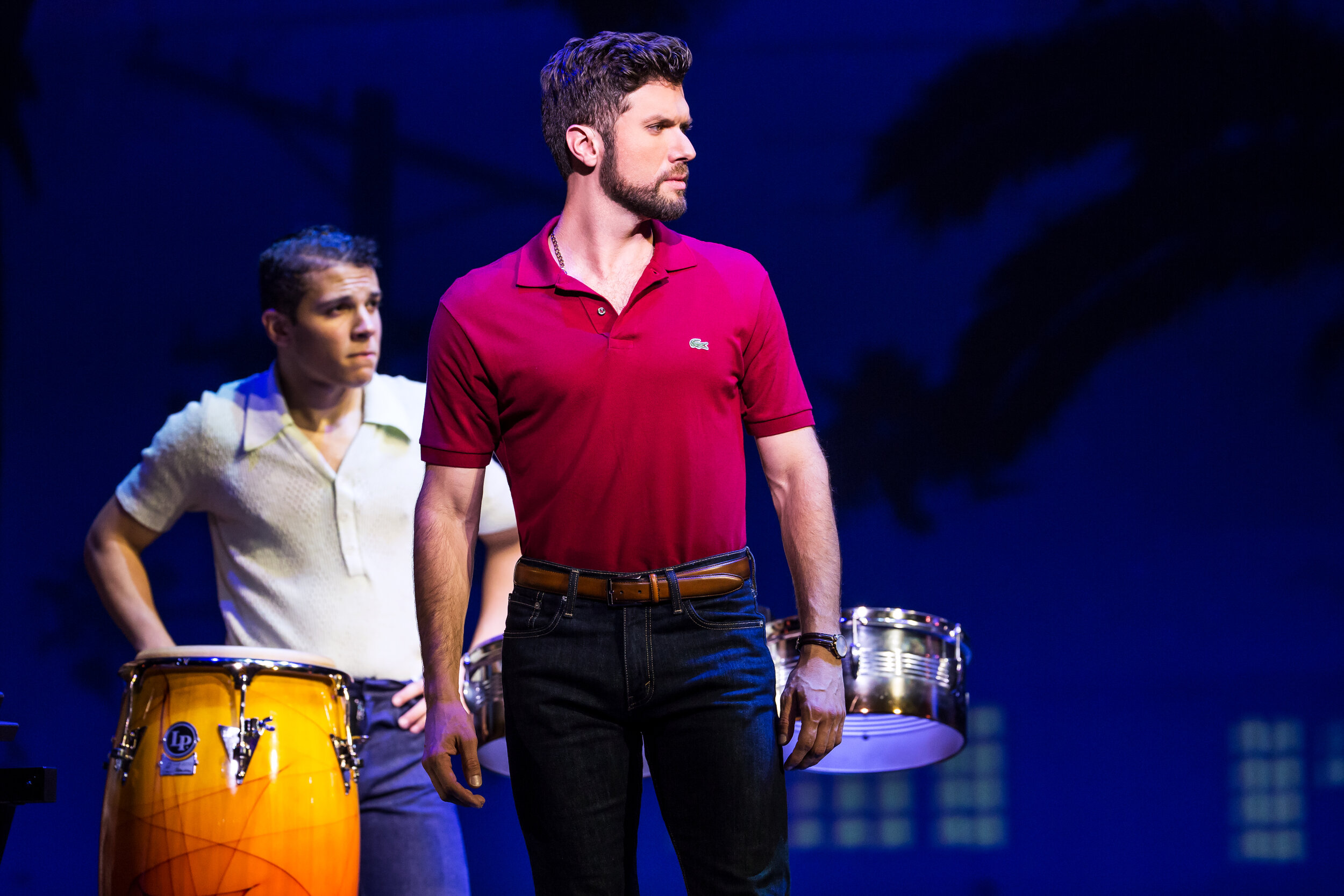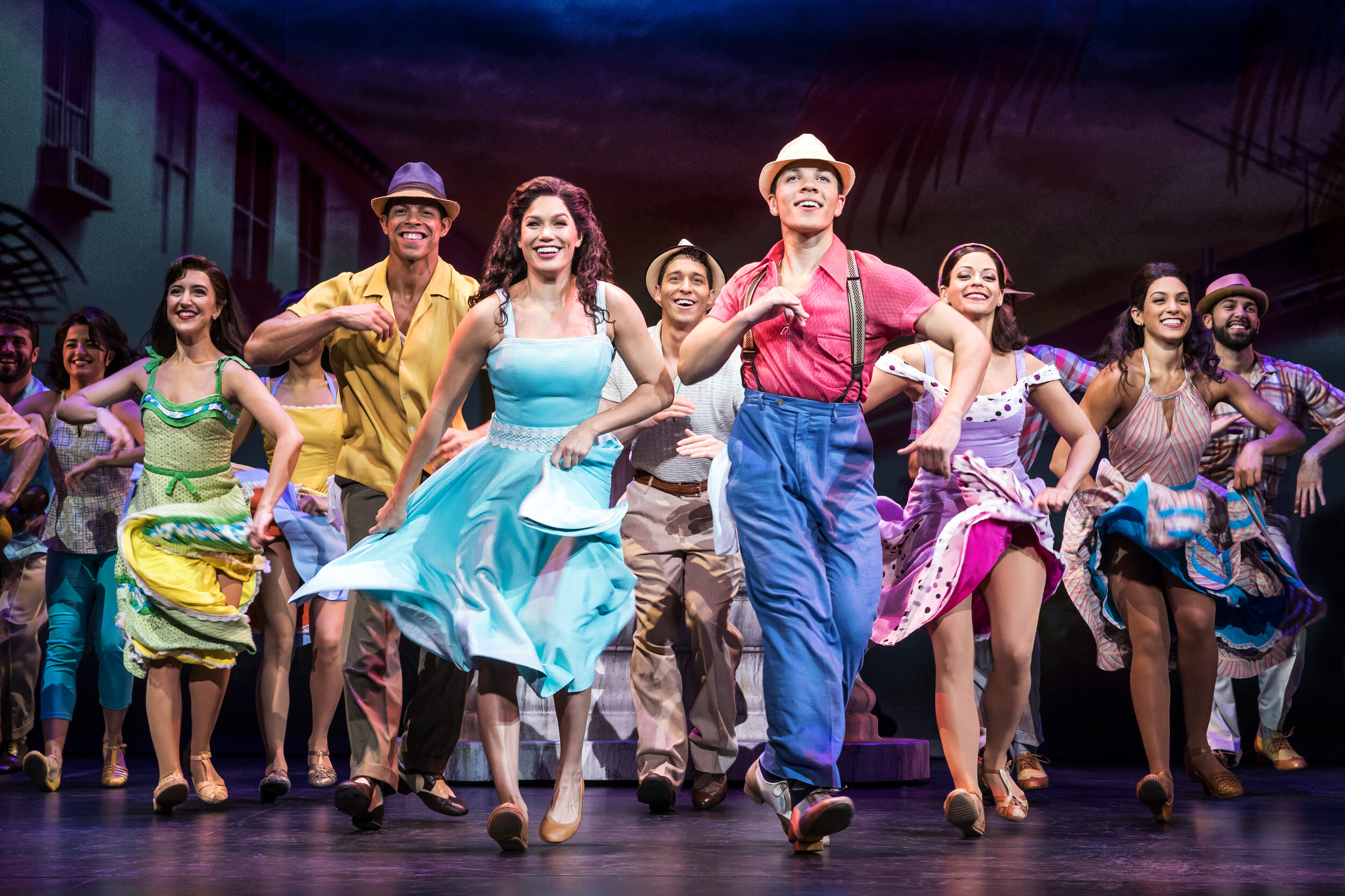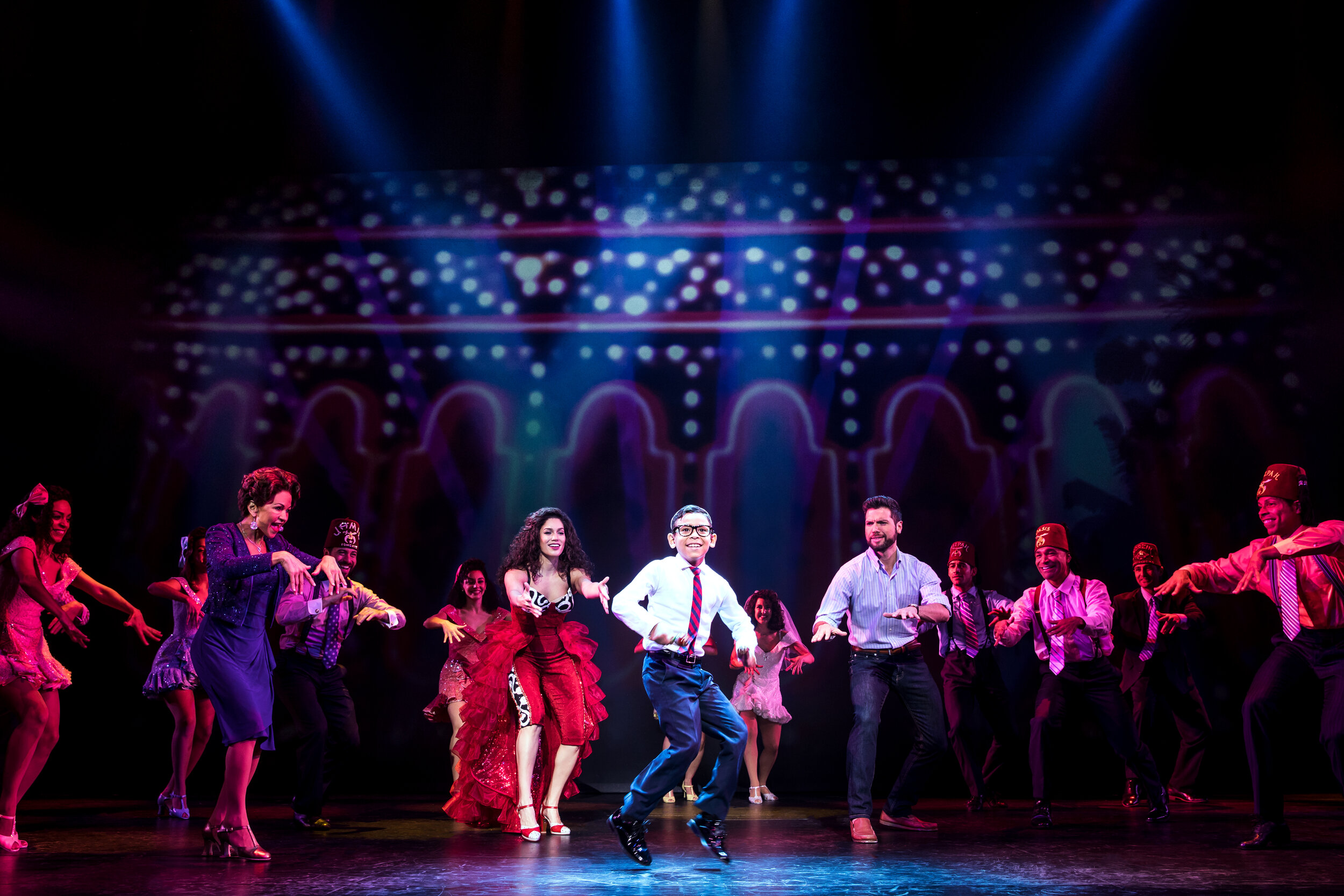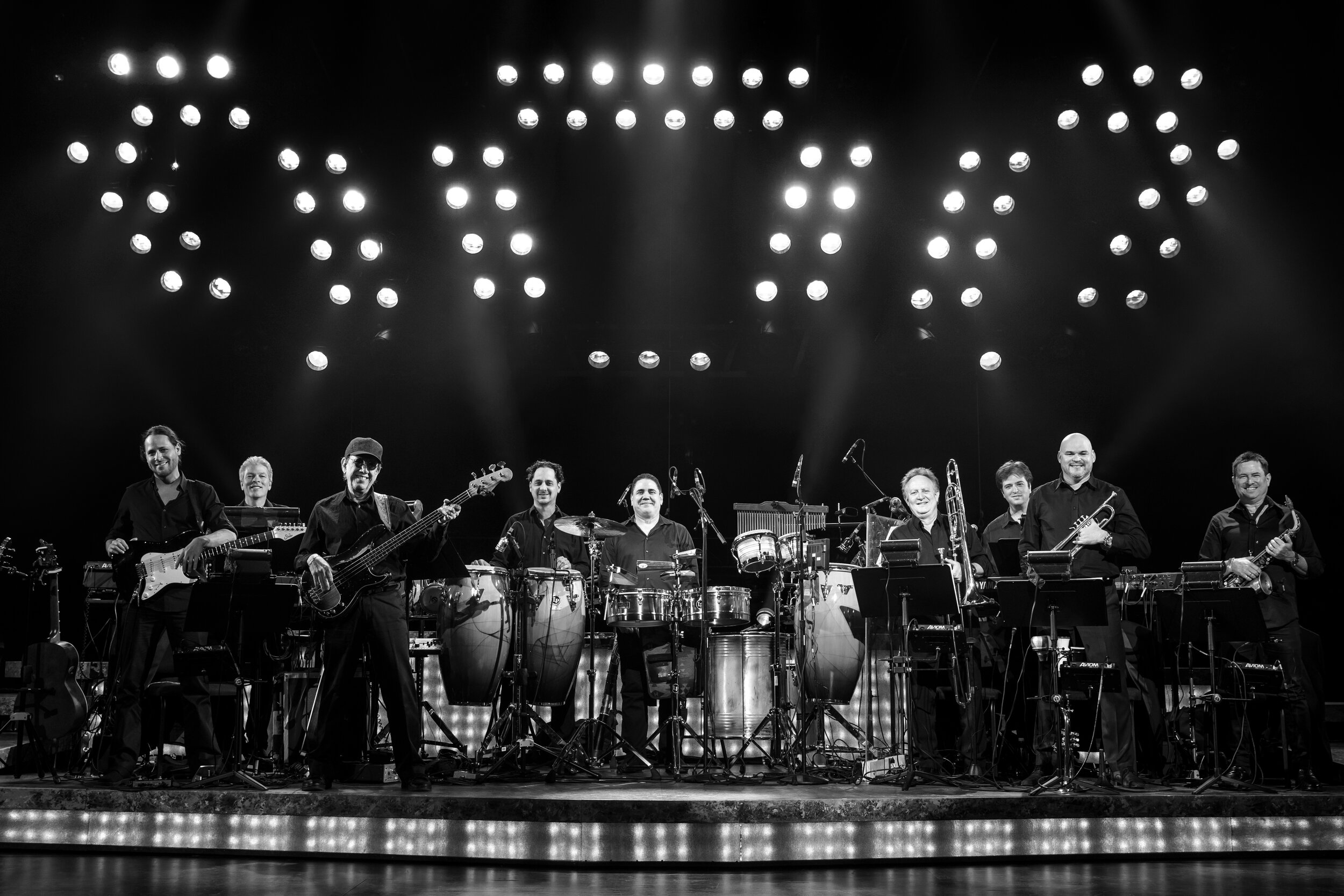Ronnie 0:00
Hey, it's Ronnie from above the basement Boston music and conversation How would you like to join us in creating great conversations that inspire and connect Patreon is a membership platform that provides a way for creators like us to build relationships and provide exclusive experiences to subscribers or patrons. So we've been self financed since we got off the ground in 2016. But in order to continue to fully invest all we can in each episode, we need your patronage. For more information, please go to patreon.com forward slash above the basement.
On your feet is a story of rhythm and resilience. It covers the lives of Gloria and Emilio Estefan to and through their success, setbacks and also love. The foundation is of course built on music, and at its core is a legendary Miami sound machine. So we sat down with George casas and Klay Oswald, two of the original members of the Miami sound machine, these guys helped bring the iconic songs to the Broadway stage. And they've been doing it really well over the last two years. Sitting in today for Chuck at the Boston opera is our friend and co host Ike Walker, we talked about this tour and the transition of pop and Latin jazz to the theater itself, the accident that changed everything and the recovery and success of a quote crossover Cuban American sound that Gloria Emilio and the Miami sound machine brought to the whole world so you can check out on your feet at the Boston opera house through April 29 2018. And so here is our conversation with clay Oswald and George casas recorded at the Boston Opera House, Boston, Massachusetts.
Really, from the perspective of someone that just saw it a few hours ago, I expected energy, but I didn't expect this energy. And so it's always nice to exceed those expectations.
Unknown Speaker 2:48
Well, we love to hear that. I mean, the show. Obviously, people come in with certain expectations to any show. We've had great results in exit polls and things like that on Broadway and on our traveling tour, where people go out with a lot better of a response much more positive than they went in with. And that's a really good sign. It's it's been an extremely effective show. It works every night. And people go out of there with a lot of good energy, good response and inspiration.
Unknown Speaker 3:19
So I'm curious, I know, you know, you've been on tour with this show for a while now. Last night was opening night in Boston. Can you really feel the difference of an opening night crowd? Like is it really distinctive? Oh, yeah, you know, you can tell it's opening night.
Unknown Speaker 3:32
Yeah, yeah, sure. There certainly are surprises. I mean, we've even in certain cities from night tonight, we get like slight differences to like what they react to one night as opposed to another night. Sometimes that can be a surprise, but opening night is usually an expecting crowd. They're expecting to be excited. And that helps
Unknown Speaker 3:51
we can usually tell them the actors can tell right away like in the first when the when the first meeting of Gloria and Amelia come on the scene right after the opening. Thank you Doug Holic crowds gonna be Yeah, just by the way, they laugh at those little moments.
Unknown Speaker 4:03
And in Miami, there was great reactions to everything. Because there's so many little Miami moments in the show where there's a radio station or nightclub mentioned or something like that. And the people in Miami would just I would do they would scream like gamers so excited I would imagine to be locally photo.
Ronnie 4:21
I would think that when you're up there, it starts with music. And you see the Miami sound machine. You see the actual Miami sound machine. Initially when I heard that I thought about what was going on in your mind the first time you did this. Now certainly you guys are doing this for a couple years now. I can't help but think about the moment or that first run. And what it was like for you guys
Unknown Speaker 4:45
to have a job.
Unknown Speaker 4:46
Well, yeah. So yeah, that's an interesting thing. Because, right, so there's the practical.
Ronnie 4:51
Yeah. And then the emotional.
Unknown Speaker 4:54
Yeah. But hopefully the two go hand in hand. I mean, yeah, we've been I mean, our history will talk about a little more goes way back. But we've been working as a band with Gloria for 31 years, which we can also talk about. But we're very proud that the music we've done has always been intended to not only inspire the crowd, but to have us enjoy it. We've never done something just to make the crowd, you know, let's do something just to make them happy. We've always been out there to enjoy what we do. So the music has enough character and spontaneity to be authentic to us. So that we've always enjoyed going out there and starting a concert with something that that makes us feel like, yeah, we've, we've got it, you know. And so now kind of like rebooting the career of glory and rebooting our career in this way. We go out there every night with that intention of like, okay, the second we hit it, we're hitting it, and the cast and the actors, they better come along with us, because because we're taking them on a ride. And that's the that's the attitude we have every night. And the cast and the crew always, always get it, they're always with us. 100%, if not more, and that's I think, driving all of us every night, so yeah, we enjoy it, it never becomes monotonous, totally repetitive job for us, we really do enjoy every time,
Unknown Speaker 6:10
that's great. I, you know, I was I was an actor in high school, I always felt like doing two or three or four shows was never enough, I always wanted more performance. So it was always sort of a dream to me to be able to do a show, you know, every night, you know, eight shows a week or whatever. And I'm, you know, I'm sure it's very tiring to, like, there's just such great energy to perform. And, and you know, when you're on tour, I imagine that, you know, the audience is sort of fresh, and every city are a little different in a way that just being on you know, in New York for a year is different than traveling around.
Unknown Speaker 6:38
The other thing about that is everyone says, Well, you know, Don't you get tired of playing this music for so long. You know, this isn't music that we just are hired to play. It's not a New York, New York is at a wedding, you know, 300 times a year, we're playing our music that we worked on for so long. And we've we've played it for so many years. And I don't know how anyone could complain about about that doing that and say, well, it's just the same old songs. Again, this is stuff we care about that we wrote that we're proud Yeah, and people are enjoying it. I mean, for two and a half hours every night, if you can't do that, and enjoy it, you got it, you should do something else, you know, really well.
Unknown Speaker 7:13
And the thing is, there are moments when it becomes a routine, you know, you can let it be a routine you're not supposed to really, but the thing that saves it for me and what I tell people and the guys at whatever is that every night that you play, all the people out there have not have never seen you and seen this, this is the first time for them. So they're paying an admission. And they're sitting down. This might be our 300th show, but it's their first Yeah, so we are so we have to you know, if you have to be that we have to be that person. That's actually that's what actually is all about us. Well, you gotta turn it on, you know, rock that are bang, here it is, you know, and we want you to hear what we got for you.
Ronnie 7:49
It's it's a few levels. George's it's interesting to hear you say that of all people too, because you're a bass player. Yeah. And we had the opportunity to talk several months ago with Leland Sklar. Oh, yeah. And who I'm sure you've heard that in the past, or he said the same thing. He said, on tour with Phil Collins, James Taylor, and the whole lineup he's been with over 40 years. Yeah, it may be the 300th show. It may be the same exact way. Even he's played a song. Yeah. But there'll be some subtleties in the bass playing that he will change maybe just for himself. Or maybe it's subconscious. Who knows. But every time he's thinking about that guy, or that girl, yeah, that's never heard the song before. That's right. I mean, it's obviously just a coincidence is because you're both bad on
Unknown Speaker 8:34
my instrument, it's a little bit easier, because you know, if I play horns, you have to play exactly the same thing and breathe the same way and cut off the same. That's what horn players do. And they're in a section
Unknown Speaker 8:44
and they're in a section. So they're playing together as part of a trio. If you are percussion, drums, or maybe even piano, all the instruments are like that. But I'm basically I, I can play a bunch of different ways and still keep it the same. You know what it means to keep that cemetery the other song?
Unknown Speaker 9:00
And if it goes too far, and if I go too far, we keep each other Yeah, yeah. But there's also the same. But the music that we have worked on for so many for so long, has spontaneity kind of built into it. This is not formulaic music. It has elements of improvisation, elements of jazz elements of things in it that are intentional. And so when we play, we have some flexibility.
Ronnie 9:24
But this is what's so fascinating to me. And sitting there last night is because you just hit the nail on the head. It's that Latin jazz based, yes with pop. But that perfect combination of music, where you have room for the spaces in there between the sections to do a little bit of subtle improv. But the irony is that you're in theater. Right? Right. Absolutely. There's so much scripted that has to happens, right? How was that transformation for you guys,
Unknown Speaker 9:54
I have to give due credit to Gloria Emilio for making sure that we were in place to make sure the music was on authentic and was created and represented in the right way. They really wanted this musical to represent what our music is about. What happens with our music is that we all have jazz vocabulary, we're all based in our music in jazz, the Miami sound machine guys that are in the band, the five of us, we all came out of that tradition of jazz before we started playing Latin. I mean, he grew up in Puerto Rico in Cuba and understanding that tradition more than me, but we came out of a jazz tradition, vocabulary wise. And what I mean by that is the melodic rhythmic understanding of how things are supposed to feel, how they're supposed to be created, and the lines that are there, we share that jazz understanding. And Gloria knew that when she hired us write, the music reflected that from when we started producing, writing and arranging the music, and the show, I think has that element in it too. And she wanted that to be there. It wasn't an accident. And I think that clearly translates to everything else, when the audience hears it, when the singers hear it. When the dancers dance, they're all kind of knowing that that's part of the palette of what's going on. And it works really well. The spontaneity is part of what makes the audience react with this like, Oh, it's really happening now. You know, it's it's not formulaic, really parts that are, of course, but Ron
Unknown Speaker 11:18
was there for opening night last night. I haven't gotten to see the show yet. Oh, I'm looking forward to it. But I was in New York last night. So I'm curious. I know, you know, we were just talking about the spontaneity I know. And a lot of musicals. You know, there's things going on on stage that are very closely tied to the music. So I wonder if there's a lot of law that you have to do that or have to be sort of old actually on time. Oh, yeah. Oh, yeah. So it's a combination of that spontaneity. But absolutely. In fact,
Unknown Speaker 11:41
that's what that's one thing we had to get used to. Because Yeah, I don't think any of us I've ever done like a Broadway musical. That's the last thing to do that, you know, we played everything. We've done this, blah, blah, blah. But it's not like the music comes in second place, or first place or anything like that. But the storytelling is That's it? That's what you have to put across?
Ronnie 12:00
Yes. So you have to support that. But at the same time, yeah, shine and yell when the show No, well, yeah,
Unknown Speaker 12:06
without going over there.
Ronnie 12:08
Yeah, it's a really interesting thing to watch on stage. And I think that the directors and Gloria and Emilio, and you guys, of course, do a fantastic job in that balance. It is really rare to see a quote unquote, real band and iconic band, it's actually playing music.
Unknown Speaker 12:27
Well, there's this challenge. The big challenge we have and we've always had is that Broadway and theater is obviously a different medium, then then then it is if you go onto a concert and you play your song from blah, blah, our challenge has been since the beginning to be able to sound somewhere like a concert, that kind of sound rich sound, which is not used on Broadway. Yeah, it's incidental. Everything else is up front. That's been our challenge up to now because all the sound man and other people and all the crew people that they have, especially dealing with sound, yeah, they're used to not having the band present. Like we want it to be present. Because that's the only way it's going to get to the people.
Ronnie 13:09
You're literally out of the pit. I mean, you guys are we're out of the
Unknown Speaker 13:11
head. And so that's the challenge that we're having, like, let
Unknown Speaker 13:14
you know, I mean, many, many audiences are also they don't like the volume is much, but there is a fine line between being powerful and having the effect of Oh, it's a concert in this scene. And then not having people be uncomfortable in their seats. Take us back a little bit, if you will, the company and what I mean the company for people listening to the podcast, correct me if I'm wrong, that's the group that you guys started in coined, maybe 80. Yeah, it actually existed before them. But yeah, our band, I joined a band that George was already a member of and in 1981 Yeah, we met in college in 1980 and 79. I came to college as a 17 year old kid from the Colorado. Very first day in college. I met john staccato as a classmate. I think I met you That same year, but maybe not right away. But yeah, 1980s and then we played in the we were in classes together in college, and we immediately formed a circle of friends, obviously in college at the University of Miami studio music and jazz program that was thriving and very successful program there. George had a band and I am joined the band in 1981. Probably that had Johnson was a singer joy Francis, our female singer and then two horn players and for rhythm section players, five members from that band, were eventually hired in 1986 to be the Miami sound machine band from 19 1986 on john de Faria on guitar, Robert Rodriguez on drums, George Cassius Clay, asphalt me and Ed Chi sax player, that nucleus of the band has really been president john de Faria and George and I wrote music together, we wrote, Get on your feet together, john was a wonderful member of the band. And Mike Scaglione soon came along, and he with us on the show now, Teddy, well, that was already in the band
Unknown Speaker 15:02
that he was in the band, the trombone player, Miami
Unknown Speaker 15:04
sound machine band. So he's still with a month few months before Yeah, and really the nucleus of Miami sound machine has been present since 1980 8586. Together going on 32 years. And I always say I like to defy anyone to tell me they know of a successful band that's worked together every year, and now with a new chapter two,
Unknown Speaker 15:25
but with this thing is, it's it's crazy to think that she's just had like a hit, like Lana said, which is a pop ballad, typical to get on your feet to be Deandra to conduct. It's just kind of all over the genres. Yes, different genres. But it's all but it's opened, somehow consistent with, you know, the thread of it, because I think
Ronnie 15:46
you're right, I think that, you know, I think the word crossover was used back in the 80s. And it was using the playlist and yeah, which is kind of a funny word in 2018. The crossover that
Unknown Speaker 15:58
doesn't, it's more of a contrived concept, when it's a corporate concept, right? marketing,
Ronnie 16:03
when really, I mean, the music that you just described, is pop, it's Latin, it's groove, it's salsa, it's jazz. And it all comes together to form a sound right there the elements of a unique sound. But what I think was really interesting to see is that is how that connects to that scene, when the character playing Emilio goes to the corporate executive, and they have the crossover talk. And there's that heated tension. And he finally culminates with a round applause. And it says, you're looking at an American right now, or what was the actual life is
Unknown Speaker 16:36
what an American whether you know it or not, this is what an American looks like, yeah.
Ronnie 16:40
And the crowd roars, you
Unknown Speaker 16:42
know, you know, which they always do. It's amazing.
Ronnie 16:44
And the theatricality of that really heightens it, of course. But that, to me really speaks to this age. Absolutely.
Unknown Speaker 16:53
I give a lot of credit to Alex Dillon are the writer of the book, who, who, you know, the first day that I walked in, and we sat down around a table and had the very first time we read through Alex's script, that dialogue was in that script word for word as it was 2014. I heard it and I just like, Wow, that's pretty cool. I've never heard that quite that way. That moment in the play, you know, it's very interesting, because racism, cultural differences, all those things are always with us. But there's a conversation going on now. That's in the public. And it's very important. And it's very crucial to how we see our country, how we see political issues, how we see economic issues. And you know, like I said, it's always been around. But there's a conversation going on that I think is is very important. And Alex really hits it on the head with that moment, because here's a person who was an immigrant, which we ultimately all are in this country. Yeah. So here's, here's, depending on timing, here's an immigrant who's coming in and has worked hard and paid his taxes and all those things that are in the play, you'll see. And he deserves and wants and strives and works hard to be part of the American dream, to be treated like that to be treated correctly the way that American supposed to be set up for. And here's a person of power in a corporate situation telling him Well, you're not good enough to be one of us yet. And he has to confront him as his boss
Ronnie 18:16
and selling that, wait a minute, wait a minute, stand up to the man, but knowing that the man is going to be the one that signs it's something you've been working on your whole life,
Unknown Speaker 18:27
I think, you know, credit to Emilio he he fought a lot of controversy, because I remember when conga came out, the company didn't I mean, this is just before we came in, like a few months, probably before, right? They didn't see it like he saw, they thought this has never never going to work. You know, and of course before that years before, Santana was the crossover Latino that was made it huge, right? It already had been done somewhere like in the blues rock era. But he faced that moment. And I don't know what he said he probably didn't say he does that. me Listen, talk that way.
Unknown Speaker 19:01
But But he must have confronted, and he knows that and he must say, and the x is the one who pushed that we got to give him credit for for that. New. I don't
Unknown Speaker 19:12
know whether or not he knew he felt very inspired to make sure that he continued down that he was very, he is very persistent. GLORIA like in the play, Gloria was much more interested in just playing her music and enjoying the art of the music, whether it was Spanish or English, or whatever. She would only really get involved in those discussions when she was strongly felt strongly opposed to something and when you see that in the play to she'll stand up and say, No, we have a contract. Those kind of things are very glorious. That's true. Yeah, she will stay out of it and just be very I want to play my music concert. But when she's confronted with something that isn't right, she will strongly stand up for that too. But it was always Emilio going to the company saying no, no, this is gonna work. Trust me, trust me. And for that he deserves to incredible.
Unknown Speaker 20:04
You can't control yourself any longer.
Unknown Speaker 20:09
You can control yourself.
Unknown Speaker 20:19
yarmulke is Emilio? I recall wearing one for my bar mitzvah. Okay,
Unknown Speaker 20:23
okay, good. Well, that's exactly what I'm taking. You're taking me to Ronkonkoma in 1961.
Unknown Speaker 20:29
No, we're playing at a bar mitzvah.
Unknown Speaker 20:32
Okay, let me think about it. No
Unknown Speaker 21:16
30 years later looking back in retrospect calm guys such a prototypical at song. It's like course, you know, when it first comes on. It's like such a sound of the time it's hard to imagine now that that was controversial, Babs? That's right. That's right. But it's also I you know, I was thinking of that as a song on stage because when I was in high school, one of the theater warm ups I would do sometimes is we would just say the lyrics of the chorus of conga. Oh really? That was a nice one to try to do very fast. Yeah, try to enunciate Well, we are in the presence
Ronnie 21:43
of the iconic band of the Miami sound machine guys. Let's take it Ike get on the microphone.
Unknown Speaker 21:49
What are we doing we're doing Congo we're doing the words all right let's see if I can remember it all right, come on everybody baby do conga know you can control yourself any longer. Come on, everybody. Can you do that conga? tonight's a pretty good tries.
Unknown Speaker 22:03
Strong. I'm watching your body baby do their conga Yeah, yeah. Don't you try? No, you can't control yourself any longer. Yes. feel the rhythm of the music getting stronger. Don't you fight it till you try to do the Congo beat the Congo beats on Yeah.
Ronnie 22:17
Tonga beat Yeah, that's that accent at the end. I never knew what they said. Oh, no, maybe? Yeah. Okay. And then rehearse by the way. Very good
Unknown Speaker 22:25
job that was written by Kiki Garcia.
Unknown Speaker 22:27
She got their first drone.
Unknown Speaker 22:28
Yeah, it was a brilliant.
Unknown Speaker 22:31
Yeah. And yeah. And that's like the weather rhyme structure. They're so great. I was listening to the Kanye West song stronger. sort of reminds me of that, because he sort of does the same thing of plan,
Unknown Speaker 22:38
you know, and stronger rhymes and Congo rhymes with longer.
Unknown Speaker 22:41
Yeah. And he I know you can't wait much longer. That's how long I've been on. Yeah, actually.
Unknown Speaker 22:47
Yeah. And you know, and in a way I just thought of this now because you know, that song Congo was written rewrap. Yeah, it's not rap at all. But if you look, if you just take those words, and you sit and you're saying, I mean, it's very rap sounding.
Unknown Speaker 23:00
What's more poetic than it is,
Ronnie 23:01
like Latin, Latin rap. I mean, the prosody.
Unknown Speaker 23:05
You can hear
Unknown Speaker 23:06
you can hear ya know,
Unknown Speaker 23:07
yeah, the pace of it. But it's but it's internal.
Unknown Speaker 23:09
It's like an it was an instant. You know, it's repetitive, something you know,
Ronnie 23:12
as geniuses that was, I have to bring up the fact. So we saw with my almost 10 year old daughter last night who was just beside her And she was so happy. This is the dancing, the singing that the outfits that oh my gosh, she was great. She told me because we you know, I prepared him a little bit. You know, I showed him a couple clips. The Miami sound machine. We did you know, Alexa, please play Miami sound machine playing? She said Oh, yeah, conga. They play that at all the bar mitzvahs? Yeah. Now. Yeah. But the ironic thing was because it has such an amazing dance groove to it. And I love it. Now. Last night. We're watching the show. And it shows how back in the day you guys had to earn your keep you played some weddings and bar mitzvahs, right, those that are real a real
Unknown Speaker 23:53
thing. Well, there's a little bit of gray area there. We never played bar mitzvahs and weddings with Gloria company, did you? Oh, yeah. We were much more instant playing jazz and fusion jazz music out and our own music was all right. Yeah, the day in 1982 or three where we started to play pop music in the clubs. We felt like we were selling out. George had done it before, but because he's had been through more musical history than some of us otherwise, but we wanted to play jazz. I never envisioned playing Latin salsa music as a career or anything like that pop radio. Yeah, we wanted to play jazz. So we started playing pop music because we wanted gigs, right? We wanted to get ready for what we did weddings, environments. Exactly. So once we went into that market in Miami to do clubs and weddings, bar mitzvahs, and all that as a band, even if we had a pop gig, we would do Oh, Monday night is jazz night, right. And we would go and play it either original music or jazz stuff that was you know, we created a big following for Monday nights. And that's how
Ronnie 24:51
you cut your teeth over a few years. Yeah,
Unknown Speaker 24:54
people people would come from all over to hear the band because we had such an interesting setup, you know, and it was a club called raffles in North Miami Beach. Plenty of people in Miami. Remember, but when we started working for Gloria, Amelia was no longer playing in the band. And it was a kind of a split to where we were hired to go do the big gigs, right? And then us starting to produce, right, arrange and do the records. Yeah, it started right away after that, because they realized that they liked what we did. Because you wrote on your feet. George and I and john to find our guitar player guys wrote on your feet.
Ronnie 25:29
Yeah. Another institution in pop music. Right. Yes. Interesting. And obviously what this is named after the this great musical, I think it sort of says a lot of things about Gloria and the Miami sound machine to begin with. And it's also metaphorical for her recovery.
Unknown Speaker 25:45
on her feet in a way for her Yeah,
Ronnie 25:47
yeah. So how was that for you guys after doing the grind, making the money playing the weddings, and then all the sudden you have this freedom to write and to just be professional musicians?
Unknown Speaker 25:59
See, that's one of the things that I don't know if we credit Gordon Emilio, but they hired us as a unit that was already functioning really well. So we were hired as a rhythm section as a band. And we already were writing together, we were already friends. We already knew each other really well. So it was a unit that was already kind of in place as he came in and hurt us in the club. And Gloria was like, Yes, I want these guys. You know, she saw that. So we saw it as a continuation of kind of what we're doing. I don't know, we kind of thought This will be fun for a little while. 31 years later. I don't think anyone talked me into that.
Unknown Speaker 26:31
I remember, I've always been the oldest because you always keep us in gap. There. We were really desperately trying to make a base as a band. We had a lot of writers, you know, the oldies, everybody wrote a lot of stuff that was almost all over the place. What we did was was kind of solidify a style, you know, we do that. And we did have some, some luck with some agents here. And there's some legit people that really wanted to take us somewhere.
Unknown Speaker 26:56
And we've been in New York a few times and face the corporate saying, No, we don't want you guys ready. Yeah, so difficult.
Unknown Speaker 27:02
It is really, really difficult to go there. You know, I mean, it's either by chance, or it's either by this a lot of stuff involved. So at that time, when they came to see us at a club, we were kind of like, something's got to happen. And something's got to happen soon. As an energy as a band, because we've all been doing this the club thing, and we've been developing, and we've been shedding a lot of stuff, you know, a lot of skins, you know, and so we'll get into this point. And pretty soon after that people are going to start to though, I mean, I just started sensing that like, oh, we're gonna go try to kill a witch, one of our guys. Even after he joined our band. During the fall, he moved to Los Angeles. So we at that point, I saw it I said, this is a good thing, guys. Yeah, open door on the door. Because we money wise at the beginning, we were doing quite well in the course Monday was different in those days. You know, we added Alex, we're taking for a long time, you know, now maybe day and a half anyway, we kind of knew that. Okay, we don't know what this is gonna be, like clay said we may be a little while but it's going to be good.
Ronnie 28:01
Then the next few years of your life. Yeah, that was a skyrocket and after 86 Yeah.
Unknown Speaker 28:06
And the other part of that little element is that we at the time, you're going through stuff like that you don't see it the same way we look like but looking back on it, I see it really different as I did when I was doing it, like we were enjoying it. And we were playing pretty big gigs. And we're writing music, but it wasn't like we thought all we've made it now we're celebrity. We were never celebrities, you know what I mean? We didn't make it the way Gloria did. We were her band. And we were still the same band that we were for all those years before. Now, there's exceptions, for instance, where we were nominated for Grammy for Producer of the Year, right? We sat in the fourth row of the downtown in LA. Yeah, looking back on it. Yeah, we felt like oh, this could be cool. We never thought we'd win. And we didn't but you know, we still were there were like, nominated for and I remember, we had no speech prepared. No, God bless, Amelia if he would have had to make a speech in front of a TV audience for Yeah, you know, because he would have been like, hysterical, but at the time you're going through it, you know, it's like, Hey, this is cool. You don't really have the perspective that you do now. So and you know, winning and
Unknown Speaker 29:06
I think that's a good thing.
Unknown Speaker 29:07
It's probably a good thing.
Ronnie 29:08
Because a lot of you're always looking to the next thing. And you guys are
Unknown Speaker 29:15
Yeah, I think as a as a musician, it's probably different than as an actor. If you're an actor and you get nominated for award you're sort of expecting it as part of the package right when you do in your present you bet as a musician it's pretty cool to like pull you from the other side behind the scenes.
Unknown Speaker 29:27
You
Unknown Speaker 29:28
know, it's you're there and your talks and it's
Unknown Speaker 29:31
kind of more Gloria got bigger. We all we what we thought of ourselves individually, like each person as a group, like when we looked in, we're still the same people that were playing at the club, and I always does that. But we knew that the more that Gloria got famous the better for us because we're going to go with her it's always been like that that
Unknown Speaker 29:47
nucleus is with you on the road now. Well, there's five of us here Yeah.
Unknown Speaker 29:51
On the on the tour, and we still enjoy it as much as we've ever enjoyed it. I mean, when we're done with every show, we feel like yeah, we really got it. We got we got to them to guess
Ronnie 30:01
who's it's in Bali person. And then Edwin banya. Yeah, he joined 92. Okay, he's not one of the five from 1986. But he joined shortly thereafter, right. And he's been a constant element to the band since then. I've always been so much in love with the marriage of the snare drum and the horns are the symbolic some of those snare and Tim boli hits along with but up the bit that but with with a massive element is so crisp that with a groove underneath,
Unknown Speaker 30:31
that's just it's just a Latin dance. Yeah,
Unknown Speaker 30:34
that's fantastic Latin music,
Ronnie 30:36
and it's rehearsed. It's really crisp and rehearsed. And you have to have it. That's intentional. And
Unknown Speaker 30:41
it's and it's stylistically crucial to getting the right you know, sound and everything. Yeah. And everybody understands that. So that's a priority no matter what, for sure.
Ronnie 30:50
The middle of the musical, I'm looking at Ike now, because he's excited to see this is the crash when I mean crash, this is the bus crash. And so I wasn't college, I remember it, reading about it over the last couple days. And then seeing it on stage yesterday hit a different part of my brain. And I was I was just amazed to see the resiliency, the recovery of Gloria and the whole team and her family, of course, which in and of itself is just a wonderful thing, no matter if you're a singer, multi Platinum around the world or you're not but I wanted to turn it to you guys. And the actual moment, were both of you on it
Unknown Speaker 31:27
while we were in a different bus that day, just to retrace it a little bit. And to remember, we had two buses during that time, Gloria's entourage and her bus and then the band bus and the band bus was more crowded. So a lot of times George and I would ride with her right and the entourage we'd play cards talk. I think we were riding with her pretty often on that particular day. We rode with the band because the band was going to Syracuse to set up for the next concert. So you were not on the bus. So we were on a different bus on that particular day. And well, you very well could have. Yeah, it was just a day difference. Yeah, I think we had an overnight right, Syracuse, and I know, it's snowing and bad, and we price slept. And when we got to Syracuse, I believe our road manager had a cell phone, which used to be like this big and it was like one of those big gigantic things. Yeah. And so he kind of knew what had guys come to my room. Come to my room, and it was cnn with the news channel, then, you know,
Unknown Speaker 32:19
it was the next day already. Yeah.
Unknown Speaker 32:20
And he said kind of my room and he's explained everything and what happened because it was I think some people had seen it on the TV already. And we're calling us
Unknown Speaker 32:27
yeah, stuff. I didn't have a clue that we all went to his room. Before soundcheck, he just he just said there's been an accident.
Unknown Speaker 32:33
His memory is better than mine.
Unknown Speaker 32:35
Yeah.
Ronnie 32:36
So basically, I'm sure it was a whirlwind time. You guys are like brothers and sisters by then you're working together all the time. One of your family's hurt,
Unknown Speaker 32:45
not what I mean, but the one we can't put.
Unknown Speaker 32:49
Right, right. Yeah.
Ronnie 32:50
And so Exactly. I just can't imagine what was going on.
Unknown Speaker 32:55
Yeah, I mean, it was chaos. And we didn't know if she would survive for a little while. Then they said she'd be okay. But she had a broken bones in her back. And we all went home pretty much right away. And George and I went back to New York, I think to visit when after her surgery.
Unknown Speaker 33:08
Yeah, yeah. But she was recuperate. Yeah.
Ronnie 33:09
When did you know this was more on hold rather than over?
Unknown Speaker 33:13
Well, Gloria is very first of all, she's very athletic. She was in great shape. And she was in her best. And she's very competitive. She doesn't she doesn't go down easily. She never did. And she was always very diligent, the right word, Belgian. You'll know what the joke is later in the show. But she was always very dedicated. And if anyone could recover and do well, again, we knew it would be her. But we didn't know the medical result and how it would turn out. So no one it was very up in the air for a while we went home and we're like, Who knows? Let's get some kicks.
Unknown Speaker 33:47
Yeah, we didn't. Yeah,
Unknown Speaker 33:48
so you played well? Um, no, we didn't play as a band as much. But I mean, what I'm saying is we need to need to find work. Emilio always was churning behind the scenes to create opportunities. And we were always involved in the opportunities and we're extremely grateful for all that but it meant we could keep working in a way we did other productions. We did a songs for the Evita soundtrack from Madonna and Jonathan price and the whole thing that Julio Iglesias vs. adore other a lot of their project, and Amelia was always churning in the background, all kinds of things. That's him. He's always pointing to the know he's not gonna stop. They never had a big fight where Gloria said you did this to me yet, but it's expressive of how he was always pushing to do more
Ronnie 34:33
and pushed her in a good way.
Unknown Speaker 34:35
Yeah, back totally. Yeah, totally. He was the one at the American Music Awards.
Unknown Speaker 34:39
Absolutely. And I'm sure it was frustrating for her. Because with the play was written when the story was written with Alex and Larry's. GLORIA was there all the time, but filtering, you know, I mean, she would give them information. I mean, I don't know this for a fact. But I know that they convened a lot, because he wanted to get the right stuff. But
Unknown Speaker 34:57
yeah, and she did, too. She did too.
Unknown Speaker 34:59
And he would come up with ideas, and she would come up with ideas. And I'm sure that that whole creative because I think the script is brilliant. And to be honest, when this first started our jadedness and our thing about Okay, here we go abroad where he knows story. We go, blah, blah, blah, we got to appeal to everybody. We were both wink wink, you notice I say, well, hope this is okay. But I'm sure we're going to get the script that we're going to vomit.
Unknown Speaker 35:21
Because, yeah,
Ronnie 35:23
your antennas were.
Unknown Speaker 35:24
I mean, they pulled this off. And this is like, yeah, this is great.
Unknown Speaker 35:30
It's a hard job as a writer, I would think, yeah, worry, you know that you're going to perform your life story here. You know, it's easier to be writing the one about Buddy Holly or
Unknown Speaker 35:38
Yeah.
Unknown Speaker 35:40
That over songs telling the story. Actually her lyrics. It was like a premonition, everything that happened to her explain through stuff that she wrote before.
Unknown Speaker 35:48
I think that's though in great credit to Alex, because it seems that way. Yes, he used the songs to tell the story, not in chronological order us songs that would help him tell the story out of place completely. And then he would integrate the story he would use he would create storylines to support that she's a great storytelling or songs. And that comes out in the way that's they're used in the musical, which I give a lot of credit to Alex, but like, anything for you was written in 1987. That was one of the big that's such a
Unknown Speaker 36:19
such a great ballad. Yeah, that was our first record.
Unknown Speaker 36:22
us in the musical. It's shown in the musical early in the play, to depict a scene which is from 1979 Yeah, they first started or 74 I don't know, even even earlier when they first started, like gathering with Gloria Emilio in the garage to write with Gloria right. Alec still an artist use that song to tell the story about how her grandmother would do anything for her if she would just you know,
Unknown Speaker 36:44
that's brilliant. Yeah, tie that in there. I thought, wow. You know, even if it's not true, who cares?
Unknown Speaker 36:50
license to move the song. Songs aren't too time specific, you know, probably I bet the song sex in the 90s probably didn't make it into the show, for example, which is a really fun song.
Unknown Speaker 37:01
All the songs are put out of place chronologically, but for instance, tredici own, which is a story about the Cuban tradition of them, what you know, their music, and their traditions are all about and how they carry them forward into other cultures is used early in the play. But it was from a record from from 1993.
Unknown Speaker 37:17
Is that the Spanish language song? Yeah, yeah.
Unknown Speaker 37:19
Yeah. Although it's in English, parts of it are in English for the play.
Unknown Speaker 37:22
Okay. Did any of the other Spanish songs like me to to that in there?
Unknown Speaker 37:25
Yes. And it's done. Again, there's some English lyrics that are interjected into that as well for the story.
Ronnie 37:31
Oh, interesting. And one of the most beautiful things was just sitting on the bed with their dad, their dad will sclerosis and at the end, and just she talks about in one of the interviews in Gloria, one of the one of the aspects of that poignant part of her life is that she would literally cry and sit by her father, you know,
Unknown Speaker 37:48
and write music or play music, music was always her therapy, her her way of dealing with her, you know, her feelings at which is beautiful. And she never wanted to be a star,
Ronnie 37:58
do you have a perspective of that crossing over? I'll use the term in a different way to start them.
Unknown Speaker 38:04
Absolutely. When we came on the scene, she was already, you know, becoming quite well known, of course, in Latin America and Latin America and a little bit in the United States, from Dr. B in England, she was clearly already becoming well known. But she wasn't really that comfortable with the idea for years, she wasn't comfortable in that star role on stage or anywhere else really. And it took a number of years for her to feel like I think it was 1991 or two, where I saw videos from now looking again, looking in the retrospect, where I see her and I go, now she really, really as comfortable on stage with us, in the center of attention, interacting with us and the crowd, a truly comfortable center of attention. And I remember meeting her the very first time she came, I actually went with a band member to her doorstep to pick up something that the guy needed. And she came to the door in her gym outfit, her sweats and her things and you know, didn't even kind of know what was no makeup, no, nice to meet you. And there was no real sense of star celebrity thing from her. She never gives that off to you the way other people do. Even now, she's extremely open and inviting.
Ronnie 39:13
But I think that with more popularity, fame, and that role, like you said, being the center of attention comes responsibility, you can see that there's such a genuine person behind this. She feels very deeply about this story and about the Cuban American story. Absolutely. So with Hamilton, for instance, the first time in years, people from all walks of life are in theater. Now, do you sense that there's this a strong presence of not only Cuban Americans, but Latina Americans?
Unknown Speaker 39:47
I think so. But But for me, I expected more of that. I think we're getting every big splash of everything. A lot of it is because there's ticket holders, theaters, crowds and things. It's a little different than dancers. So all that has come into it. But I had first thought that I had first thought Oh, you will go to New York. Oh, my The first thing I thought of all the lat I mean, New York is like all that and you know, kind of thing. Oh, it's the same with Hamilton, Tamil descent other racial, racial, political. How about it? I mean, that's, that's right there. And that hit a nerve. And that's, that's a brilliant play, and musical and all that.
Ronnie 40:21
But you're right. 98% of the audience is probably the, you know, white theater, it's not
Unknown Speaker 40:25
going to be African Americans more. It's it's right across the board, you know, and that's why the theater has a voice. I think it's true that we have that in places like for instance, Philadelphia, we did fantastic. And Philadelphia, Miami, of course. So I don't know,
Unknown Speaker 40:41
I think there's something to be said for this because there's clearly a direction. And I don't think you reverse that direction. And the direction is this, I think that now the opportunity for people to to express their cultures in Broadway and on on drama stages, and in music is more open than it was before. And the direction is part of the mission, you know, and I'm a guy from Colorado from a German background, and you know, another type of immigrant but a long time ago, but I relate to this a lot, because my wife is Cuban American, my friends in Miami have all expressed to me what it's what this thing's is about to them. And I've heard the stories that have 100 times that are in the play. And my wife says, Oh, my God, that's that's your story of my life. And I mean, Cuban? Yeah. So so. So the cast of our play is 98%, Latino, Latina. And it's a mission for Gloria Emilio and the cast and crew to make sure that it's expressed with authenticity, with meaningfulness, that immigrants from everywhere can understand that idea. Yeah. And Alex, again, his writing expresses that no matter where you're from, and that direction, I hope opens doors. And I think it's even though we expected maybe more response from Latino crowds. I mean, the response is great, yeah. But when we do our shows, I think there's a lot more Latino and culturally mixed people that come to the shows, and would come to see other shows, as well as Hamilton, you go into Hamilton, and you do see a very, very supportive crowd from the African American culture. What was the Oprah Winfrey? Color Purple? Yeah, I mean, clearly, it's it opens the doors for cultures that are not typically on Broadway. So I think that direction is irreversible. And I hope it continues.
Unknown Speaker 42:36
Yeah. And I think this is really a moment in time. And I think it's there's a reason why I was in New York a couple days ago, and I saw once on this island is back on Broadway. And there's a reason why that show is come back after almost 20 years, you know, this is the time for another show with you know, Caribbean sound. Yeah, now Latino cast that is, you know, it's really nice to see sort of the evolution of Broadway, because, you know, Broadway changes a lot over the years, and it's not all about showtunes anymore.
Unknown Speaker 43:00
Clearly, the music from Hamilton is a, it's a departure from the past of Broadway. And that's beautiful. You know, the Hamilton theater was right next to ours in the marquee. And we have all our friends are in that show, and all their friends are in our show. And we had parties together. And it was like a very communal, it was a mission, there's a mission going on. And that is to make sure that the culture and the backgrounds of our personnel are represented. I
Unknown Speaker 43:24
just wish this stuff taking our actors.
Unknown Speaker 43:26
Yeah, they took from you.
Unknown Speaker 43:29
Yeah, they poach a couple of you, we have a problem to say.
Unknown Speaker 43:32
Right? But
Unknown Speaker 43:34
that's like an offer you can't refuse. Think about this.
Unknown Speaker 43:37
Think about this, a Puerto Rican Writer, producer, director and all that and very different culture, people who created that show. And it's seen as an African American representation, right, because they chose people with different color skin. And they rewrote the story to represent the entire immigrant story and the African American story as well. And the rewrote the story with different different intentions. I think that's a great, that's why it's become so successful. And our show has some of that too. For sure. We
Unknown Speaker 44:08
the African American music, the blues, the rap, that kind of thing. And the Latin American music that happens on so it's the same Africans, right? They just went to different places. It's Afro American, and it's Afro Cuban.
Unknown Speaker 44:20
So not always, willingly.
Ronnie 44:23
Yeah, exactly. Okay, that's very rarely the new play then. Yeah, same Africans.
Unknown Speaker 44:28
Yes. The same. We should we should join with Lynn let's talk them
Unknown Speaker 44:31
I assume the rhythm is gonna get she was in the shower. Yeah, so who gets to do the call and response at the at the beginning?
Unknown Speaker 44:38
This thing these singers and actors? GLORIA the band doesn't get to do that.
Unknown Speaker 44:42
No, we don't say we don't sing we do
Unknown Speaker 44:44
it like without mice. Yeah,
Unknown Speaker 44:46
yeah. Now we're that's a different union. Yeah, but yeah, the there's a singer and a dancer that do the call and then the cast as a response at the beginning of the show. Yeah.
Ronnie 44:55
On your feet. Klay and George thank you guys so much for being here. The name on your feet says so much about the show but it says a lot about Miami sign machine how you guys have stayed literally on your feet for 30 some odd years. The history the perspective of that along with the current musical as you guys become now new veterans in the musical world to is fascinating. So thanks for your time and and the discussion. Thanks for having us. Thank you.
Unknown Speaker 46:51
So you remember when I saw you that after we met with a fresh ending and did the show we get take the ball straight up to Syracuse. Yeah, we can take the ball straight up too soon. Emilio's got invited to a private dinner for Sony know When? Tomorrow night we have to New York right after the show.
Unknown Speaker 47:06
Okay, it's my one night off and I'm exhausted. I can't even just tell them we can't go.
Unknown Speaker 47:11
today. We have to lose Megan appearance.
Unknown Speaker 47:13
You're gonna make me go. I'm gonna make Google.
Unknown Speaker 47:16
I hate you. I know.
Unknown Speaker 47:19
I know.
Ronnie 48:02
We'd like to thank Klay Oswald and George Costas, for joining us today at the Boston Opera House. Their perspective on the Miami sound machine and history that contributes to this great musical on your feet was a real treat for us. I saw the musical my family, it blew me away. I was literally I have to say on my feet at the end. We are dancing in the aisles and the music was fantastic. Check out on your feet through April 29 2018. And while you're at it, you can go to Boston dot Broadway. com for all the awesome shows coming up in the 2018 19 season. Go to above the basement calm where you can join us on Patreon. Sign up for our newsletter. Listen and subscribe to our podcast like us on Facebook. Follow us on Twitter and look at all the nice pictures we post on Instagram. We are everywhere. On behalf of Ike and myself and Chuck Thanks for listening. Tell your friends and remember a Boston music like its history is you
Transcribed by https://otter.ai


